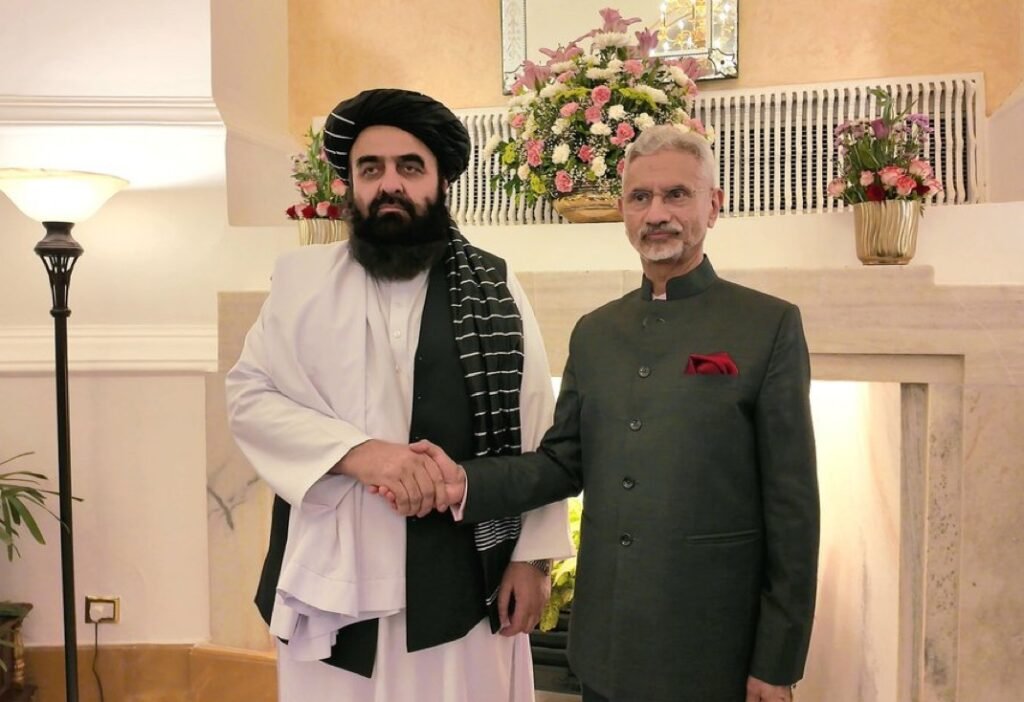A New Chapter in Kabul: Why India’s Return Matters More Than Recognition

Amir Khan Mutaqi, Taliban foreign minister, with India’s External Affairs Minister S. Jaishankar during Mutaqi’s first visit to New Delhi since the Taliban’s return to power in August 2021. (Photo: Taliban Ministry of Foreign Affairs/X)
By A. Shafaq
In October 2025, India formally upgraded its diplomatic mission in Kabul from a “technical mission” to full embassy status — a signal not only of heightened engagement, but of a subtle recalibration of policy toward Afghanistan. Importantly, this step does not equate to formal recognition of the Taliban government. Yet in Afghanistan’s post-2021 vacuum, India’s reengagement may be among the most consequential acts of international diplomacy.
By returning to Kabul in a more robust form, India is staking a claim to be a stabilizing and humanitarian force in a region mired in uncertainty. Its move underscores a delicate balance: engaging without validating, influencing without capitulation, and preserving vital interests without signing on to an unpalatable regime.
Engagement without Recognition
No country to date has formally recognized the Taliban’s rule, now in power since August 2021. Russia became the first state in mid-2025 to grant formal recognition, a move whose implications remain heavily debated. Other nations have maintained unofficial ties, conditional engagement, or purely functional contacts.
India’s approach has long been characterized by caution. It has refused formal recognition, opted for gradual engagement, and insisted its contact is guided by strategic interests and humanitarian imperatives. For India, unlocking influence in Kabul means accepting a realpolitik that few other democracies have embraced in Afghanistan’s evolving geopolitics.
The transition from a technical mission to full embassy does not change India’s legal posture — it does not confer legitimacy on the Taliban, but does grant India deeper access, legitimacy of presence, and diplomatic posture. It allows India to renew consultations, coordinate aid, and maintain a presence under international conventions of diplomacy — all without losing room to dissent.
Why India’s Return Matters: Stakes, Strategy, and Soft Power
Why should the world pay attention? Because India has uniquely entrenched stakes in Afghanistan — strategic, historical, security, and human.
1. Strategic Footprint in a Struggling State
Afghanistan, though faltering, remains geo-strategically poised. It is a land bridge between South Asia, Central Asia, Iran, and China. In a contest of influence, India cannot afford absence. By returning to Kabul, New Delhi signals that its capabilities and interests in infrastructure, connectivity (notably via Iran’s Chabahar Port), minerals, and trade are not casualties of regime change.
India has already used humanitarian and developmental projects as a foundation for a benign presence. Since 2021, India has delivered tens of thousands of tons of wheat, medicines, relief goods, and supported health and education infrastructure. In doing so, it maintains goodwill among Afghan populations — and a thread of legitimacy independent of regime change.
2. Counterbalance to Rival Influence
By reasserting itself, India counters the advance of Pakistan, China, and even Russia or Iran in Afghanistan. Pakistan historically had deeper ties to the Taliban, and China has sought to expand economic influence. India’s more visible engagement disrupts narratives of a zero-sum regional contest.
Moreover, as Pakistan’s position fractures (not least over cross-border terrorist group tensions), India sees an opening to recalibrate regional influence.
3. Moral and Humanitarian Legitimacy
India has long framed its engagement as being for the Afghan people — not the regime. This moral posture allows it to act where others hesitate. Through aid, health, education and reconstruction efforts, India can preserve moral credibility while working from “within the margins” of diplomacy — nudging in favor of human rights, women’s education, and accountable governance.
In a fractured global order, states that remain present — rather than absent — often wield disproportionate moral leverage.
A. Shafaq (pseudonym) is a researcher and lecturer at one of the private universities in Kabul.
Note: The contents of the article are of sole responsibility of the author. Afghan Diaspora Network will not be responsible for any inaccurate or incorrect statement in the articles.






